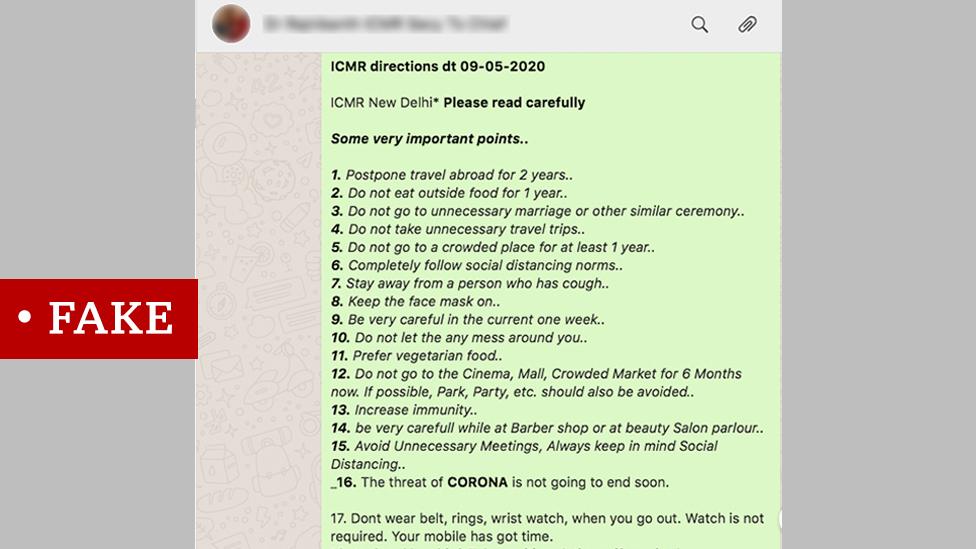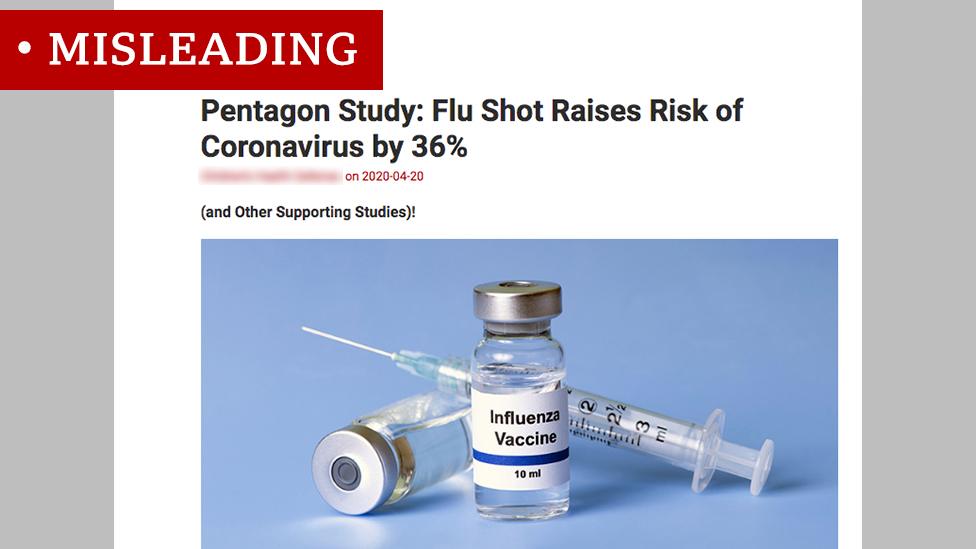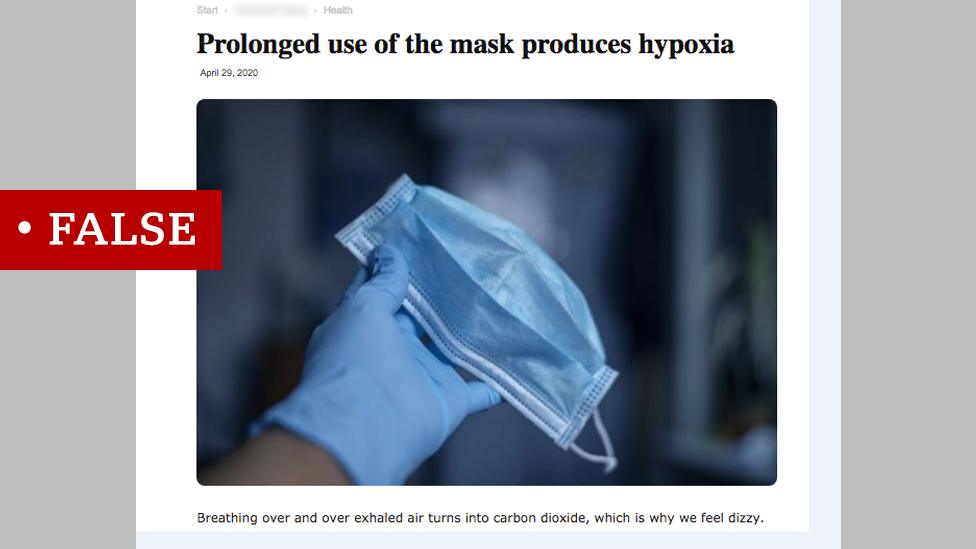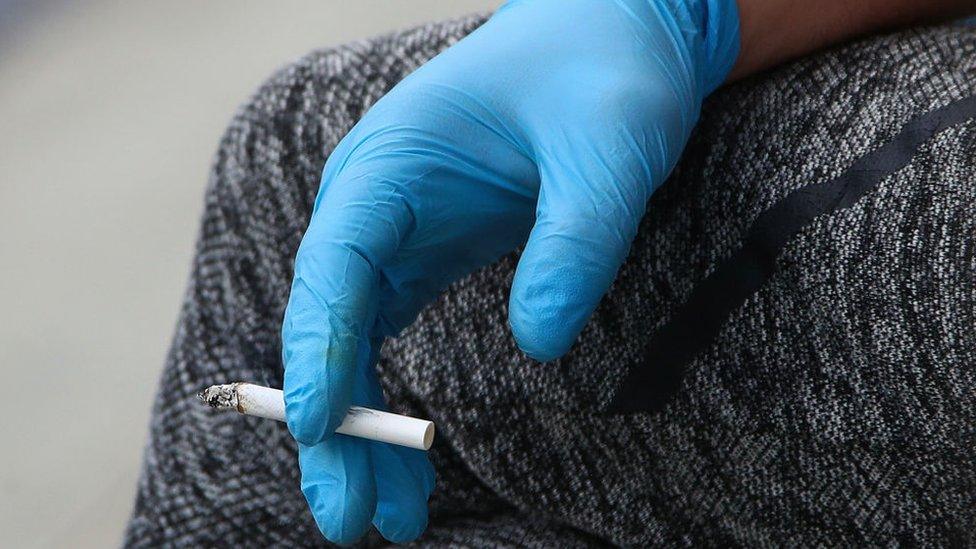Coronavirus: Which health claims are circulating online?
- Published

Sticking to a vegetarian diet may be healthy, but it won't stave off coronavirus
As the coronavirus pandemic continues to affect countries across the world, false and misleading health advice is still being widely shared online.
We've taken a look at some of the most recent examples and where they've come from.
1. The doctors who didn't recommend vegetarianism
Often, messages will be shared containing generally sound advice but mixed in with additional claims that are clearly misleading and even potentially harmful. Because they are frequently shared on encrypted social media platforms they can be difficult to track.
Two of India's leading medical institutions and a top Indian doctor have criticised a fake message widely shared in WhatsApp groups attributing health advice to them.

The message contains a long list of precautions to take to avoid getting the virus, many of them very sensible such as social distancing, avoiding crowded areas and observing personal hygiene.
But it also advises a vegetarian diet, and to avoid wearing belts, rings or wristwatches.
None of these measures has been shown to protect against the virus.
Nutritional advice from the WHO relating to Covid-19 suggests consuming some meat as well as eating fruit and vegetables, in order to have a balanced diet and stay healthy. , external
2. The flu vaccine won't put you at greater risk of Covid-19
This is an important one to highlight because it points to a real study, but draws misleading conclusions from it.
A widely shared Facebook post claims if you've had a flu jab you're significantly more likely to contract Covid-19.
The post links to a study published by the US military, external as evidence.

But this study was published in October 2019, before the Sars-CoV-2 virus responsible for Covid-19 was identified, and the data used in it was from the 2017-18 flu season.
For the avoidance of doubt, there is no evidence that a flu jab increases your risk of contracting Covid-19.
The guidance from the US Centers for Disease Control is clear: "Influenza vaccination does not make people more susceptible to other respiratory infections."
3. Prolonged wearing of face masks is not harmful
Another misleading article being shared on social media claims the prolonged wearing of masks is dangerous to health.
The claim first appeared online in Spanish and was circulated widely in South and Central America.

A translation later made its way into English-language outlets, including a Nigerian news site which was shared more than 55,000 times on Facebook.
The article claims prolonged breathing while wearing masks leads to inhalation of carbon dioxide, which makes people dizzy and also deprives the body of oxygen. It recommends lifting the masks every 10 minutes.
Dr Richard Mihigo, of the World Health Organization, told the BBC that the claims are not true and could actually be dangerous.
"Non-medical and medical masks are made from woven fabric that has high breathability. The masks should allow you to breathe normally and prevent particles from passing through," he said.
Coronavirus: How to wear a face covering
He also says the advice that people should keep lifting the masks to inhale to avoid harmful effects could expose them to contamination.
There are some situations in which face masks might not be advised:
children under two whose lungs haven't fully developed
people with respiratory conditions who may struggle to breathe
4. Smoking doesn't help ward off the virus
And here's a claim that keeps recurring, one that smokers would like to be true - but isn't.
There's no evidence that they're less likely to be at risk from Covid-19, but there are plenty of articles that suggest they might be be.
This one, for example from the UK Mail Online - shared tens of thousands of times, suggests there's "more evidence smoking may cut the risk of coronavirus". , external

Smoking can have serious health consequences
It said a review of studies from a number of countries showed that smokers are less common among Covid-19 patients who end up in hospital than would be expected.
It added that experts were struggling to explain if there was a connection.
One study by a leading French hospital suggested that it could be nicotine which might be stopping the Covid-19 infection spreading.
Research is going on to test what impact nicotine patches and nicotine replacement therapies might have on the coronavirus.
But the WHO says: "There is currently insufficient information to confirm any link between tobacco or nicotine in the prevention or treatment of Covid-19."
It adds that smokers are more vulnerable to serious illness from coronavirus because of other health issues associated with smoking., external
And there's been clear medical advice that people who smoke should quit during the current pandemic as it could increase their chances of a severe form of lung disease.
Research by Shruti Menon in Delhi and Peter Mwai in Nairobi

EASY STEPS: How to keep safe
A SIMPLE GUIDE: What are the symptoms?
GETTING READY: How prepared is the UK?
MAPS AND CHARTS: Visual guide to the outbreak
VIDEO: The 20-second hand wash

